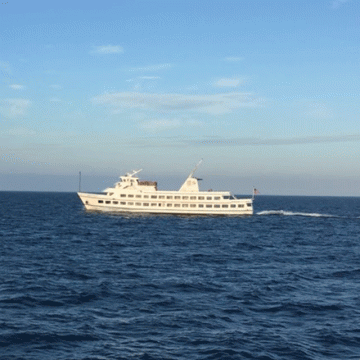Andy Castrenze ‘20MS graduated from the School of Library and Information Science archives program this spring. But this will not be Castrenze’s first career.
Prior to his studies, Castrenze was a Captain with Hy-Line Cruises. If you've taken the ferry from Hyannis to Nantucket, it’s possible that Castrenze was the one responsible for getting you there. While still working full time, he enrolled at the Harvard Extension School and graduated with a master's in liberal arts, concentrating in history in November 2017.
Researching his thesis introduced him to the Berea College Archives, which ignited his interest in archival studies.
After 30 years at the helm, Castrenze is eager for new challenges.
Looking back on his time at Simmons, Castrenze reflects on his Rwanda study abroad trip, which he describes as “life-changing.”
“Going so far away, to such a different part of the world, and being in a developing country and getting to know the people there — it’s hard to describe how incredible that was. It was an amazing opportunity,” he said.

While thinking about his future, Castrenze acknowledges the ageism that is ripe in so many industries. “I think that there is a certain amount of age discrimination,” he noted. “On the other hand, I have a lot of management experience and life experience that no 30-year-old can match.”
Included in those life experiences: facing a 35-foot wave while driving a tug-boat from Savannah, Georgia to Miami, Florida.
“The moonlight was out so we could see the seas even though it was the middle of the night,” he recalled. “And there were these huge, rolling waves. It’s like looking at hills coming at you. I saw one wave breaking and rolling and coming at us and I thought, that wave is coming through that window.” This went on for hours, and as each wave hit, anyone trying to sleep was physically lifted off the bed. The crew folded their mattress in half and used rags to tie themselves inside, he said, “like a hot dog roll.”
Archives offer a different kind of excitement. “I find it fascinating,” he said. “Thinking of what is original, and what needs to be preserved for the long term.”
Castrenze is also excited about the potential for outreach with the community while working as an Archivist. “As my second career begins, I hope that my first job gives me some opportunities for outreach, particularly to primary and secondary school students. I personally believe that the skill of critical thinking is not being stressed enough to young people and I would like to have some small part in changing that.”
When asked about his passion for archives, Castrenze said: “One of the main reasons that I am so interested in archives is rooted in the study of history — without primary source material, the study of history couldn't exist. Even with primary source materials, writing about history can lead to speculation by an author, interpreting the historical record needs to be done cautiously and be based on evidence. Being involved in the profession that is dedicated to organizing and preserving the historical record is both a great responsibility and a great inspiration.”

